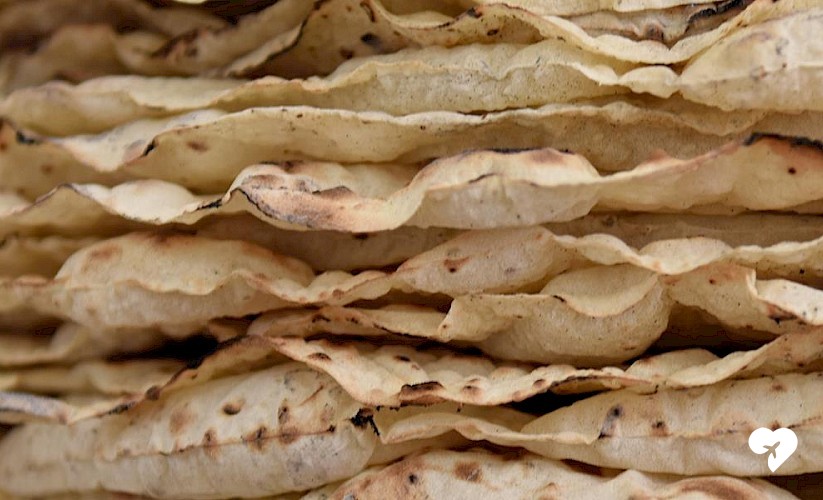Lavash, Katyrma, Jupka and Yufka being varieties of round- or oval-shaped thin breads that take shape by rolling dough by hand or using a dough roller, called "oklava" symbolizes not only a consumption element but also a common making and sharing culture inherited from the past in the involving regions of Azerbaijan, Iran, Kazakhstan, Kyrgyzstan and Turkey.
Both types of bread are made from wheat or rye and from leavened or unleavened dough. While lavash is cooked in earthen or stone ovens called "tandır" that are made by traditional methods, yufka is, after being prepared by unleavened dough to prevent its spoilage in the long term, it is cooked on a metal plate known as "sac" over the fire. Communities in Kazakhstan and Kyrgyzstan cook it in big cauldrons (called "kazan") heated on fire. With regards to taste, cooking on embers, or with wood that does not release soot is preferred.
 Photo: Gülcan ACAR
Photo: Gülcan ACAR
The preparation of flat bread involves traditional practices based on collective labor and sharing. As an indication of social solidarity in rural areas, each family prepare and cook their breads together with the aid of their neighbors.
Traditionally, flatbread is cooked at homes by family members, and in restaurants and bakeries by flatbread masters, who learn their profession through a master-apprentice relationship. In addition to their daily preparation and consumption, these breads are also prepared for special occasions and ceremonies such as holidays, weddings and funerals. On such special days, the person who will participate in the collective making of flatbread, bring her own flour and tools with her as an example of social solidarity.
The flatbread preparation bears a variety of social and cultural functions for its communities especially in terms of its usage at special occasions and its relation to transition between seasons. Among the communities of the five countries of this multinational file, the oven/furnace/tandır used for making bread is considered as sacred. These places are kept clean, preserved and protected. As an outstanding practice in Turkey, bread is never thrown to the ground, and a piece of bread which is accidentally dropped to the ground will be kissed three times and then placed at a raised location, above the head level. Flatbread are made and consumed on special days, occasions and invitations such as the month of Ramadan, holidays, weddings, funerals and winter preparations. In Kazakhstan, people believe preparing flatbread at funerals helps the deceased get protection from the burning Sun while waiting for decision of the God. In Turkey, wedding invitations involve the distributing flatbread to every house in the neighborhood, as part of a tradition locally known as “bread throwing”. In Azerbaijani and Iranian weddings, the flatbread lavash is often put on shoulders of the bride in order to wish prosperity and wealth to newly-married couple. During the gatherings for preparing flatbread, the housewives not only share tasks regarding the making of bread, but also share their daily thoughts and troubles and provide support to each. This aspect serves to emphasize the social side of cooperative bread making.
Tradition of making and sharing flatbread is practiced generally in most of the regions of these five countries. More specifically; in Azerbaijan, flatbread tradition (mostly under the name "Lavaş", but also "Yukha") is practiced especially in the regions of Baku, Nakhchivan, Sheki, Gabala, Karabakh, Ganja and Lenkaran; in Iran, it is practiced mostly with the name "Lavash" in all regions; In Kazakhstan, it is practiced mostly with the name "Katyrma" in all regions; in Kyrgyzstan, mostly under the name "Jupka", it is widespread in all regions of Osh, Jalal-Abad, Batken, Chui. Lso, in Turkey, it is mostly known as “Lavaş” and “Yufka” in all regions of the country especially in rural areas.

In both rural and urban areas, the tradition is continued mostly by women in living spaces and by bread masters in restaurants and bakeries. During the preparation of flatbread, task sharing is performed between individuals based on their experience and skills. As such, the most experienced and skilled persons are in charge of kneading, rolling and cooking the dough, while the youth and the children – as an introduction to the transmission process of the tradition – are in charge of preparing the bezes and in providing adults the tools and materials they need while working on the dough. The knowledge and skills related to the element have been transmitted today through family and community members by means of oral communication, observation and participation. In restaurants and bakeries, the tradition is transmitted through master-apprentice relationship. Through the parent-child relationship within the family, children begin to learn this tradition from an early age by playing with bread dough. In addition, the traditional knowledge regarding flatbread making is also being taught formally in vocational high schools, vocational schools of higher education, and apprenticeship schools through applied courses.
Most known museums and cultural spaces about the element in Turkey are; Ankara Intangible Cultural Heritage Museum, Bread Museum (Ankara), Gaziantep Emine Göğüş Culinary Museum, Şanlıurfa Traditional Cuisine Museum, Living Museum (Beypazarı/Ankara).
"Flatbread making and sharing culture: Lavash, Katyrma, Jupka, Yufka" was inscribed on the Representative List of Intangible Cultural Heritage of Humanity in the eleventh session of the Intergovernmental Committee for the Safeguarding of the Intangible Cultural Heritage took place in Ethiopia/ Addis Ababa, from 28 November to 2 December 2016 as multinational element of Azerbaijan, Iran, Kazakhstan, Kyrgyzstan and Turkey.
